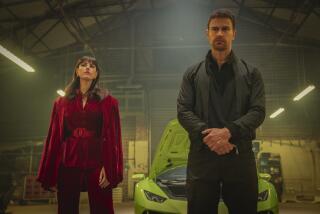Jesse James: The Myths
- Share via
The Hon. James R. Ross, a retired Orange County Superior Court judge, is a great-grandson of legendary outlaw Jesse James and the author of “I Jesse James,” a four-generational saga about his family. “American Outlaws,” the latest screen version of the James gang saga, opened Aug. 17. The following are Judge Ross’ comments on the film and the myth and truths of Jesse James’ life.
How has the truth of the life of Jesse James become so maligned and how have so many myths arisen? Les Mayfield, director of the new movie “American Outlaws” said--as many directors have before him--”As far as I’m concerned, Jesse James is a myth; his real life and demise are great mysteries.”
That’s just incorrect--there have been many books with years of research to tell the truth--books by such authors as William Settle, Robertus Love, John Newman Edwards, Ted Yeatman and my own. The myths started in dime novels and the Police Gazette even before Jesse’s death. Obviously Jesse and his brother Frank could not bring and pursue a lawsuit (they were outlaws, you know). By my count, there have been 36 movies about Jesse James and not one has attempted to tell the truth, even though the truth is more exciting than the myths. And the love story of Jesse and his cousin, Zee Mims, is more poignant and beautiful than any of the false stories.
The biggest and most famous of the movies was “Jesse James,” starring Tyrone Power and Henry Fonda in 1939. The legendary Darryl Zanuck, head man of 20th Century Fox, promised my mother Jo James Ross that he would use her script instead of a completely false screenplay by Nunnally Johnson. But at the premiere of “Jesse James,” when asked about how the movie compared to history, she answered: “Well, there were two men named Jesse and Frank James, and, oh yes, they did ride horses.” This quote became famous around the world.
Why can’t something be done about the falsity? Because the law states very clearly that once a person dies, anything can be said, written and published about him and there is no defamation or invasion of privacy accruing to his heirs. For example, my grandfather Jesse James Jr. was after his death portrayed as a bank and train robber in “Bitter Heritage,” while in fact he was a well-respected lawyer in Kansas City, Mo., and Los Angeles.
Now let’s go to the myths perpetuated by “American Outlaws.”
Myth No. 1: The expansion of the railroads caused Jesse and Frank to become outlaws.
The film implies that Jesse and Frank became outlaws because the railroads were forcing the James family and neighbors to sell their farms for almost nothing to the railroads--that’s false. There were never any plans for any railroad to come anyplace close to the James farm or any neighboring farm.
Myth No. 2: The James family and the Youngers were related as cousins.
Unless someone knows my family history better than my family, this is another inaccuracy. They weren’t related.
Myth No. 3: Jesse was a hard drinker.
In reality, Jesse was a God-fearing man and carried a Bible with him at all times (he quoted from the Book often as well) and never once drank.
Myth No. 4: Zerelda James, Jesse and Frank’s mother (Ma James in the movie), was killed by federal agents.
The truth is that a bomb manufactured in a U.S. arsenal for the Pinkertons with the express purpose of burning the James compound--known as “Castle James”--to the ground resulted in the death of Archie Samuel, the 8-year-old half brother of Jesse and Frank. The bomb also blew off the right arm of their mother, but she was not killed; she lived to be 92. Jesse and Frank were not home when the bomb went off.
Myth No. 5: Jesse had a relatively peaceful childhood.
The film shows that Jesse suffered no trauma in his youth. The truth is that at 15 years of age he was beaten by ropes and horsewhips by the Kansas Jayhawker federal militia and watched as his stepfather was hung on the James farm, in part because they were Southern sympathizers.
Myth No. 6: The James Gang hid out in caves.
As Frank James in later life so aptly put it, “Jesse and I never went into any place that didn’t have a back door.”
Myth No. 7: The James-Younger gang never had a hideout in Texas.
In truth they did have such a hideout which they called “Peace Ranch,” known by the Texans as “James Hollow.” I confirmed the truth of this last year, and the historical society “The James-Younger Gang” is sponsoring a convention in San Angelo, Texas, from Oct. 4-7. They’ll view the site of the main hideout and hear talks by historians about the truth of Jesse James and the James-Younger gang.
Myth No. 8: Jesse James was anti-African American.
Actually, he financed the first school for blacks in Missouri.
In simple language, the only truth in “American Outlaws” is that there was a James-Younger gang and they did ride horses.
I’ve spent 50 years opposing the most popular myths associated with my great-grandfather and I challenge anyone to point out any movie that is more exciting than the real story. I hope that one day someone in the entertainment industry will produce an exciting movie of outlaws and gunslinging, filled with a tremendous love story, and yet remain true to the life of Jesse James.
More to Read
Only good movies
Get the Indie Focus newsletter, Mark Olsen's weekly guide to the world of cinema.
You may occasionally receive promotional content from the Los Angeles Times.










